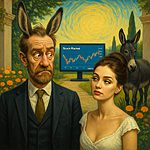Market Psychology Books: Why Real-Life Experience, Not Books, Leads to Market Victory
Jan 13, 2025
“In the battlefield of the financial markets, the greatest enemy is not external. It is within. Victory comes to those who master their psychology as much as their strategy.”
This statement is not hyperbole. The truth separates winners from the masses in the volatile game of the stock market. Financial success is not solely about analyzing charts or crunching numbers; it is about understanding the intricate web of emotions, cognitive biases, and irrational tendencies that dictate decisions. To ignore this is to walk into battle blindfolded. Market psychology books are the weapons that prepare you for this war.
If you wish to conquer the market, you must first conquer yourself.
The Underrated Edge: Market Psychology
While most investors obsess over technical analysis and balance sheets, only a few dare to explore the most crucial factor: human behavior. Market psychology is not merely a peripheral aspect of investing; it is the lifeblood of every market movement, every trend, and every crash. Understanding the collective emotions that drive the market—fear, greed, hope, and panic—is akin to deciphering the playbook of your adversaries.
Market psychology books go beyond the shallow advice of “buy low, sell high.” They delve deep into the mind, exposing the traps set by our biases, heuristics, and emotional impulses. This is not just education—it’s empowerment.
The Essential Reads
1. Thinking, Fast and Slow by Daniel Kahneman
This masterpiece lays bare the dual processes of human thought: System 1, the impulsive and emotional decision-maker, and System 2, the analytical and deliberate counterpart. Kahneman’s exploration of cognitive biases, such as overconfidence and loss aversion, reveals why even the most experienced investors fall into irrational patterns.
Consider the market crashes of 2008 or 2020. System 1 dominated as fear spread like wildfire, leading to panic selling. Those who leaned on System 2—acting rationally and buying undervalued assets—reaped massive rewards when the markets rebounded. This book teaches you to quiet the emotional noise and think like the contrarian genius the market fears.
2. The Psychology of Money by Morgan Housel
Housel argues that wealth creation is not purely a function of knowledge or technical skill but of temperament and behaviour. Through compelling anecdotes and data, he explains why the wealthy often approach risk differently and how patience can be a greater asset than any complex strategy.
For instance, the story of Ronald Read—a janitor who amassed $8 million by consistently investing and reinvesting dividends—proves that market psychology trumps flashy tactics. The book is a manual for understanding that the market rewards discipline, not impulsiveness.
3. The Little Book of Behavioral Investing by James Montier
Montier unravels the psychological traps investors face, from herd mentality to confirmation bias. His practical tips, such as creating checklists and implementing pre-commitment strategies, are battle-tested solutions to irrational decision-making.
A striking example is the phenomenon of “anchoring bias,” where investors cling to arbitrary price levels. In 2022, Bitcoin’s sharp fall below $30,000 caused many to hold on, believing it would bounce back quickly. Montier’s principles warn against such traps, emphasizing data over hope.
4. Misbehaving: The Making of Behavioral Economics by Richard Thaler
Thaler’s work is a humorous yet cutting critique of the assumption that humans are rational actors. He highlights how biases like the “endowment effect” and “status quo bias” cause investors to cling to poor decisions.
Consider the dot-com bubble of the late 1990s. Thaler’s insights explain why investors refused to sell overvalued tech stocks, driven by irrational optimism. The following crash was a painful lesson for those who ignored behavioural economics. This book equips you to spot such bubbles before they burst.
5. The Crowd: A Study of the Popular Mind by Gustave Le Bon
Written over a century ago, this book remains a chillingly accurate analysis of how crowds think and act. Le Bon’s dissection of herd behaviour explains why markets often overreact in both directions.
Look at the GameStop frenzy of 2021. A Reddit-fueled crowd sent the stock soaring, driven by collective euphoria rather than fundamentals. Those who understood Le Bon’s insights anticipated the inevitable crash, while others were left nursing losses.
Psychological Forces That Rule Markets
Fear and Greed
These two emotions are the twin engines of market movement. When fear dominates, stocks plummet as investors flee to safety. When greed takes over, valuations soar beyond reason. Understanding and acting against these cycles sets the exceptional investor apart.
Herd Mentality
Crowds are rarely wise. Following the majority often leads to disaster. Market psychology books teach you to identify when the herd drives irrational behaviour and how to exploit it.
Overconfidence Bias
The market humbles even the best. Overconfidence leads to excessive risk-taking, often with disastrous consequences. Books like Thinking, Fast and Slow help you stay grounded, ensuring your strategies are rooted in reality.
A Bold Case Study: The 2020 Pandemic Crash
When COVID-19 struck, markets plummeted in a frenzy of fear. The S&P 500 lost a third of its value in weeks. Retail investors sold en masse, believing the world was ending. Yet, those who understood market psychology saw an opportunity in the chaos.
Take Warren Buffett’s advice: “Be fearful when others are greedy, and greedy when others are fearful.” Investors who acted on this principle and bought during the March 2020 crash enjoyed historic gains as markets rebounded. Market psychology books teach you to see beyond the panic and act decisively when others hesitate.
The Synergy of Psychology and Strategy
Understanding market psychology is not an alternative to technical analysis or fundamental research—it’s a complement. The most successful investors integrate these disciplines, using psychology to enhance their timing and execution.
Example: Technical Meets Psychological
A bullish flag pattern on a chart indicates a potential breakout. But without understanding mass psychology, you might miss the critical context: Are investors overly optimistic, signalling a false breakout? Or are they cautiously optimistic, suggesting real momentum?
Market psychology books provide the context that transforms technical signals into actionable insights.
Practical Tips to Master Market Psychology
- Track Your Emotions: Keep a journal of your investment decisions, noting the emotions behind them. Over time, patterns will emerge, revealing your biases.
- Adopt a Contrarian Mindset: When fear grips the market, prepare to buy. When euphoria reigns, consider selling.
- Set Rules and Stick to Them: To avoid emotional decision-making, define your entry and exit criteria in advance.
- Learn from History: Study past bubbles and crashes to recognize recurring patterns of human behavior.
Conclusion: The Path to Mastery
Success in the market is not reserved for the brilliant or the lucky—it belongs to those who understand human nature. Market psychology books are not mere reading material; they are the training grounds for the mind, shaping you into an investor who thrives in chaos and remains disciplined in euphoria.
To win in the market is to understand it, and to understand it is to understand yourself. Read these books. Master their lessons. Only then will you unlock the secrets to dominating the market game?
The market awaits your conquest. Will you rise to the challenge?















